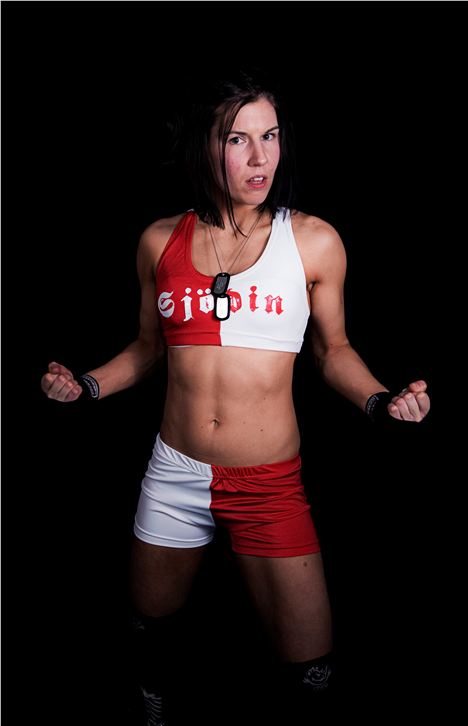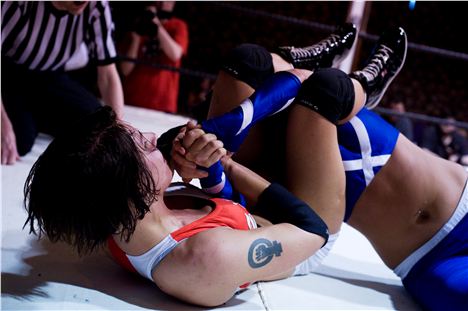EVERYONE'S got a selling point. What's mine? I'm a female professional wrestler from Sweden. Got your attention?
I know, I know. I “don't look like a wrestler”. That's most people's reaction. But hey, do you actually know what a female wrestler looks like?
If you do a more detailed study you might find that her ears aren't exactly symmetrical. Her hair is possibly torn from getting rubbed against the canvas a few hours a week. In case her neck appears a little short, it implies she has done a lot of bridging. She'll usually have good posture, most likely because of her strength, but it could also be that she's proud of a newly learned hold or just has muscle soreness from hell. It can be hard to tell the difference.
Now I was able to lift and squat with men, 50 per cent heavier than me, lying on my shoulders.
In contrast to the common belief female wrestlers look like male rugby players or extremely dedicated body builders, in reality, we don't differ a great deal from other women. At least when we're wearing clothes. Nonetheless, I'd still argue wrestling is the best sport on earth; for women in particular, both from a physical and a mental point of view
I've done acrobatics, swimming, weight training, grappling, MMA and running. None of those can compare to the intensity required in the various elements of wrestling; power, endurance, speed, technique, tenacity, consistency and discipline. What else? This game builds character.
I remember how it took me a few months before I managed my first double-leg takedown in a training match, on a four years younger and three kilos lighter training partner. I'll never forget the confidence that overwhelmed every part of my body.
 Jenny Sjödin - photo by Rob Brazier Jr.
Jenny Sjödin - photo by Rob Brazier Jr.
My coaches, however, were not as impressed with my new move as with the actual process of achieving it. Rather than skills, they valued character. Hard work. That I had swallowed my pride and returned to the mats after consecutive weeks of disastrous sessions. That I constantly showed passion to improve, whether I was criticised or praised. Funnily, I can't remember any employer or work place as focused on work ethic and ambition as my first wrestling gym.
Dan Gable, the American Olympic gold medal winner (who didn't give away one single point during the 1972 Munich games), summarises it: "More enduringly than any other sport, wrestling teaches self-control and pride. Some have wrestled without great skill, none have wrestled without pride."
Some old school wrestling coaches reckon it takes about a year just to build up someone's neck muscles to the point where it's safe to enter competitions. By the time you reach that point, you've got something real to be proud of.
In another training match, a few years later, I wrestled a guy weighing 20 kilos more than me. I had his head and arm locked and threw him backwards over myself - a standard suplex. As the pride hit me, I instantly thought about my former coaches, the process, and about when I started out - not even able to do one single push-up. Now I was able to lift and squat with men, 50 per cent heavier than me, lying on my shoulders.
 Jenny Sjödin - photo by Rob Brazier Jr.
Jenny Sjödin - photo by Rob Brazier Jr.
I thought about how I, at the age of 21, found it completely natural to give up my university studies and promising future as a political editor, to move abroad and bet everything I had for a future in wrestling.
It's like blind love, except I've never regretted one single moment. Of course I've faced difficulties on the way, but if you've ever reached the point of being able to endure a fitness session of 75 minutes with amateur wrestlers, it feels like you're pretty much set to manage anything in life.
So, apart from gaining body control, self-discipline, and monstrous strength, without necessarily looking like a monster, wrestling builds a rare and genuine confidence.
However, if you're not suddenly going to turn your life around by picking up this greatest of all sports, I understand.
Believe it or not, there are other ways to get fit. In fact, that's why I'm here.
In my future columns you'll be reading a lot about strength training, as well as general fitness, what to eat, and how to improve whatever training you're currently doing or starting - but mainly about muscles, bones and heavy lifting.
Ultimately, I think that's one of the best ways to improve both mental and physical health.
Jenny has competed in both grappling and pro wrestling, around Europe and the US. She is also a qualified level 3 personal trainer with a level 3 nutrition qualification. For more information, please visit www.sjodintraining.co.uk
You can follow Jenny on Twitter @jennysjdin



